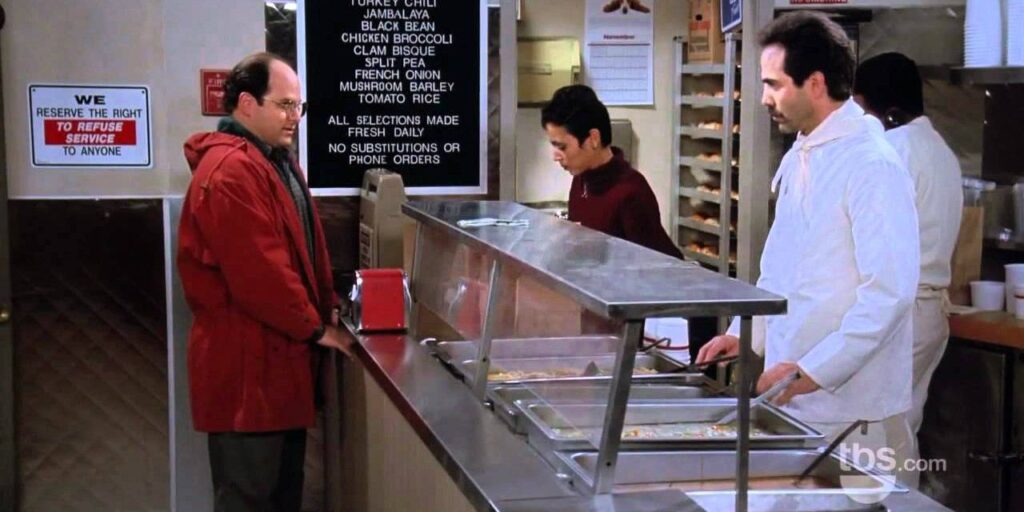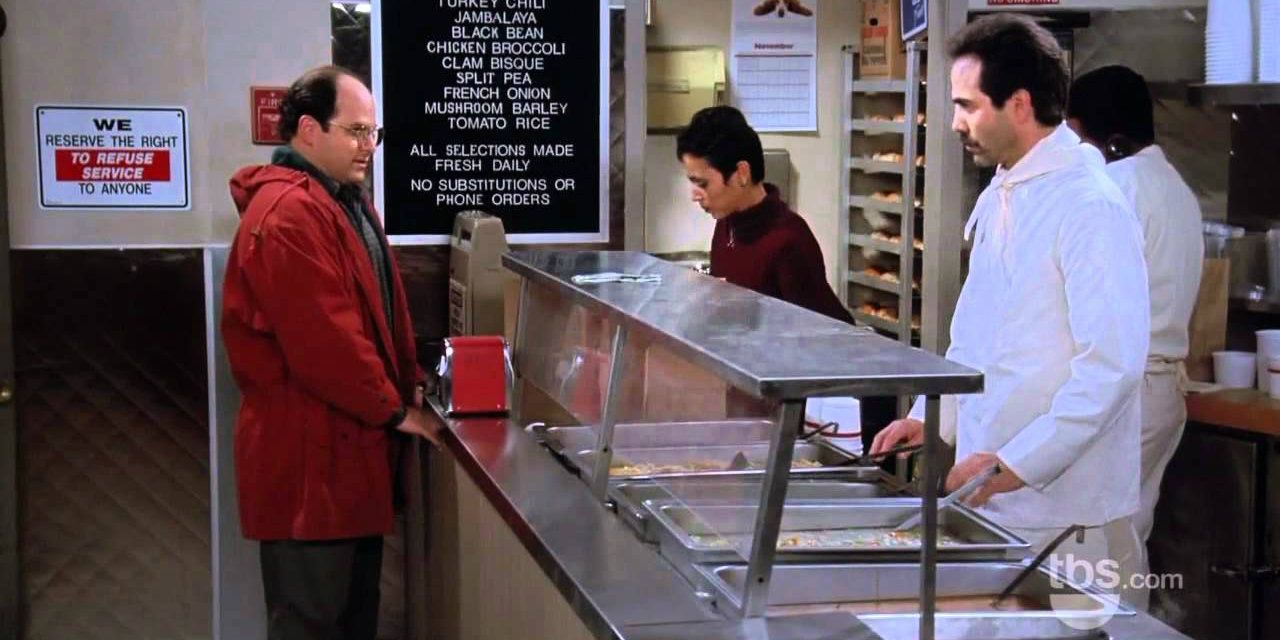
No Soup For You! Deconstructing the Iconic Seinfeld Soup Episode
The “Soup Nazi.” Just uttering that phrase conjures up images of Al Yeganeh, the real-life inspiration for one of Seinfeld’s most memorable episodes. Officially titled “The Soup,” it’s universally known as “The Soup Nazi” episode and remains a cultural touchstone, even decades after its initial airing. But what makes this particular episode so enduringly funny? Let’s delve into the layers of comedy and cultural impact that make the Seinfeld soup episode a television classic.
The Plot Thickens: A Synopsis of the Soup Episode
The premise of the Seinfeld soup episode is deceptively simple. Jerry, Elaine, and George discover a soup kitchen run by a temperamental chef who demands strict adherence to his rules. His soups are legendary, but one misstep, one deviation from his precise instructions, and you’re met with the infamous declaration: “No soup for you!”
Jerry manages to navigate the Soup Nazi’s stringent protocols and enjoys a delicious bowl of Mulligatawny. George, however, is banned after trying to expedite his order. Elaine initially charms the Soup Nazi, but her relationship sours when she obtains his recipes and uses them to undermine his authority.
Intertwined with the soup storyline is a subplot involving Kramer and his new armoire. This separate narrative, while seemingly unrelated, provides a perfect comedic counterpoint to the escalating tension surrounding the Soup Nazi. It’s classic Seinfeld: storylines interwoven with brilliant precision.
The Real-Life Soup Nazi: Al Yeganeh
The Seinfeld soup episode draws heavily from the real-life experiences of writer Spike Feresten, who frequented Al Yeganeh’s soup stand in New York City. Yeganeh, known for his incredibly delicious soup and equally volatile personality, served as the direct inspiration for the character. While Yeganeh initially enjoyed the attention, he reportedly became enraged when Larry David refused to tone down the character’s portrayal. He even confronted Jerry Seinfeld, yelling the infamous phrase “No soup for you!”
This blurring of the lines between fiction and reality is a hallmark of Seinfeld. The show often took inspiration from everyday life, exaggerating the mundane and turning it into comedic gold. The Seinfeld soup episode is a prime example of this, capturing the absurdity of human behavior and the often-irrational rules we create for ourselves.
Why the Soup Nazi Resonates: Exploring the Episode’s Appeal
Several factors contribute to the enduring popularity of the Seinfeld soup episode.
- Relatability: We’ve all encountered someone who wields power, however small, with an iron fist. The Soup Nazi embodies this archetype, making him instantly recognizable and relatable.
- The Power Dynamic: The episode explores the dynamics of power and control. The Soup Nazi’s arbitrary rules highlight the absurdity of bureaucratic processes and the ways in which individuals can exert authority, even over something as simple as soup.
- Catchphrases: “No soup for you!” has become a ubiquitous catchphrase, transcending the show itself. Its simple yet impactful delivery makes it easily quotable and applicable to a variety of situations.
- Perfect Execution: The episode is perfectly paced, with each storyline contributing to the overall comedic effect. The writing is sharp, the acting is superb, and the direction is flawless.
The Soup Nazi’s Legacy: Cultural Impact and Beyond
The Seinfeld soup episode has had a significant impact on popular culture. The term “Soup Nazi” has entered the lexicon, used to describe anyone who is overly strict or controlling. The episode has been referenced in countless other television shows and movies, solidifying its place in comedic history. The Seinfeld soup episode is a masterclass in comedic writing and performance.
Beyond its comedic value, the episode also offers a commentary on customer service, the pursuit of culinary excellence, and the often-absurd rules that govern our lives. The Soup Nazi, despite his unpleasant demeanor, is undeniably passionate about his craft. He demands perfection and is unwilling to compromise on quality. This dedication, while taken to an extreme, is ultimately what makes his soup so desirable.
Analyzing the Comedy: The Art of the Absurd
The humor in the Seinfeld soup episode stems from its embrace of the absurd. The Soup Nazi’s stringent rules, the lengths to which people will go to obtain his soup, and the seemingly arbitrary nature of his bans all contribute to the episode’s comedic effect. It’s a reflection of how seriously people can take seemingly trivial things, and how easily we can become obsessed with the unobtainable.
The juxtaposition of the soup storyline with Kramer’s armoire subplot further enhances the episode’s comedic impact. The armoire, a symbol of domesticity and comfort, stands in stark contrast to the Soup Nazi’s chaotic and unpredictable world. This contrast highlights the absurdity of both situations, creating a comedic synergy that is greater than the sum of its parts.
Memorable Moments from the Soup Episode
The Seinfeld soup episode is packed with memorable moments, including:
- George’s failed attempt to expedite his order, resulting in his banishment.
- Elaine’s initial success with the Soup Nazi, followed by her downfall after obtaining his recipes.
- Kramer’s struggle to get the armoire into his apartment.
- Jerry’s calm and calculated approach to ordering soup, contrasting sharply with the other characters’ frantic behavior.
- The Soup Nazi’s iconic declaration: “No soup for you!”
The Writing Behind the Legend: Spike Feresten’s Inspiration
Spike Feresten, the writer of the Seinfeld soup episode, deserves significant credit for its success. Drawing from his own experiences at Al Yeganeh’s soup stand, Feresten crafted a storyline that was both hilarious and insightful. He captured the essence of Yeganeh’s personality and translated it into a memorable and iconic character. The Seinfeld soup episode truly showcases excellent writing.
Feresten’s ability to weave together multiple storylines, create believable characters, and deliver sharp, witty dialogue is what makes the episode so enduringly funny. He understood the essence of Seinfeld: finding humor in the everyday and exaggerating the mundane to create comedic gold.
The Soup Nazi Today: Where is Al Yeganeh Now?
Al Yeganeh, the real-life Soup Nazi, continues to operate his soup business in New York City. While he initially expressed displeasure with the Seinfeld soup episode, he has since come to embrace his notoriety. His soup remains highly sought after, and his restaurant continues to attract fans from around the world.
Despite his gruff exterior, Yeganeh is a culinary perfectionist who is passionate about his craft. He is committed to using only the freshest ingredients and preparing his soup with the utmost care. This dedication to quality is what has made his soup so legendary, and it’s what continues to draw customers to his restaurant today. The legacy of the Seinfeld soup episode lives on, both in the world of television and in the real-world culinary scene.
The Enduring Appeal of Seinfeld: Why It Still Matters
Seinfeld, as a whole, continues to resonate with audiences because it’s a show about nothing and everything. It explores the trivialities of everyday life, the awkward social interactions, and the often-irrational behaviors that make us human. The Seinfeld soup episode is a perfect example of this, capturing the essence of the show’s comedic genius.
The show’s timeless humor, relatable characters, and sharp writing make it just as relevant today as it was when it first aired. Seinfeld is a reminder that comedy can be found in the most unexpected places, and that even the most mundane aspects of life can be fodder for laughter. [See also: Seinfeld’s Best Episodes] The Seinfeld soup episode is an all-time classic.
Conclusion: The Soup Nazi’s Lasting Impression
The Seinfeld soup episode is more than just a funny television show. It’s a cultural phenomenon that has entered the lexicon and continues to resonate with audiences today. The Soup Nazi, with his stringent rules and iconic catchphrase, has become a symbol of power, control, and the often-absurd nature of human behavior. So next time you find yourself facing a difficult or demanding situation, remember the Soup Nazi and his unwavering commitment to quality. Just don’t forget to follow the rules, or you might find yourself saying, “No soup for me!”

